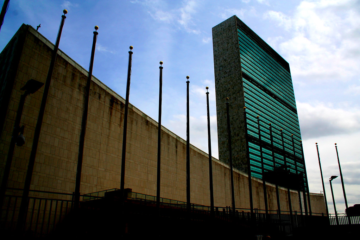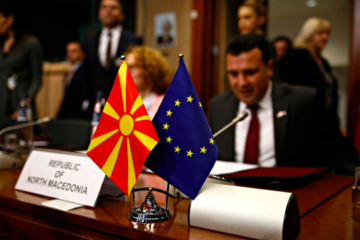Few states have done more to capture global attention in recent years than the Russian Federation. The invasion and annexation of eastern Ukraine, the devastating intervention in Syria, the election meddling on either side of the Atlantic, and the splashy antics of Russia’s oligarch class have kept the former great power atop headlines across the world. Curiosity and concern still linger about where Vladimir Putin may take his country and its foreign policy next.
I sat down with Professor Tomila Lankina, a specialist of Russian and Eurasian domestic and foreign policy, the day after Vladimir Putin’s re-election to take in the state and future of the post-Soviet sphere. We discussed the nature of Russian election meddling, what it tells us about similar foreign endeavours, the ambitions of the perennial Russian leader, and how this all may be checked.
I would like to start with the recent elections which secured a fourth term for Vladimir Putin— but under rather suspicious circumstances. How do you think election meddling factored into his victory?
I looked at the statistics for the 2012 elections where there were mass protests surrounding the parliamentary elections that happened in December so by the time we got to the March presidential elections the regime was evidently concerned. They tried to convey the image that the presidential elections were clean because what angered and offended ordinary people was that the falsifications were so blatant and they were observed by many people and observer organisations. But then as now, the regime is very concerned to show that the turnout is high and that the vote for Putin is high. And now my impression from looking at these statistics for both these elections is that they tried very hard to show that not only is the turnout and vote for Putin high in 2018, but that it is higher than it was in 2012— they’re trying to show this continued mass rally effect.
This is not going to happen without manipulations which we know are happening and there are plenty of reports of different kinds of intimidation strategies, mobilisation of the electorate strategies, and plain ballot stuffing. It was not a clean election.
Usually when we talk about election meddling and Vladimir Putin, it is in the context of his foreign policy and his interventions into Western democracies. Is there a relationship between the election meddling at home and abroad?
When they meddle in elections outside of Russia they are using a playbook that they have perfected within Russia. Manipulating public opinion and planting fabricated stories about political opponents are very much practiced tactics in the context of Russia’s elections. And certainly with the allegations of electoral interference in the American presidential elections we’re seeing some of that.
But in terms of domestic electoral violations, I certainly don’t see much difference. I had a paper out a couple of years ago, co-authored with Dr Rodion Skovoroda called “Fabricating Votes for Putin: New Tests of Fraud and Electoral Manipulations from Russia,” and in this paper we analysed suspicious vote count statistics indicative of election fraud. And we consistently see the same regions in Russia producing suspicious vote outcomes in successive elections. Chechnya is one of those regions, where you get over 90% in favour of the incumbent candidate.
When the meddling is done at home, the desire and outcome are clear: regime stability. But when it’s done abroad it comes with the cost of expulsions, sanctions, and tremendous animosity. Domestically election meddling may be quite successful, but can we say the same for election meddling internationally?
Well foreign policy is intricately connected with Russia’s domestic policy so in this sense these kinds of events – as well as events such as the poisoning of the Sergey Skripal and his daughter Yulia – produce a rally effect around Putin in Russia. And certainly Russian television has been mulling over this story in ways that may have benefited and boosted the vote for Putin. We may not know who ordered or who executed that attack, but events like this may have the effect of bolstering the domestic regime. And certainly that has worked with Ukraine when Russia went in and annexed Crimea, certainly there was a rally effect for the regime in power. Whether the political elites in Russia, those individuals surrounding Putin, are economically benefiting from his rule, whether they will find it in their interests if a new round of Western sanctions kicks in and possible money laundering is being investigated perhaps more aggressively, we will see how that plays out. It may well be that those elites will become disgruntled with the regime.

You mentioned a “rally effect” of domestic support for increasingly aggressive foreign policy. When we talk about Russian aggression today, all eyes are on the Baltics. In this fourth term, how much are you thinking about the potential for a serious conflagration in Estonia, Latvia, and Lithuania?
What I found in my earlier research on Ukraine, analysing the media propaganda during the few months before and after Russia annexed Crimea and went into the Donbass, is that Putin is not so much a strategist as a tactician. He is very good at learning tactically from events as they unfold and he is very good at tailoring Russia’s responses to unfolding events on the ground. So I certainly found that when protests were happening in Ukraine Russia ramped up anti-protestor, anti-Western propaganda after the leader of Ukraine, Yanukovych, fled the country. And I think with the Baltics, if Russia were to pursue some kind of intervention that would violate national sovereignty or further engage in hybrid warfare, it would be very tactically dependent on the response that Russia is receiving from the West now to these allegations of an apparent attempted assassination on British soil. So I think there is a very strong tactical dimension. And this policy is not irrational. It is in fact very rational and very calculated, but in a kind of tactical way: we’ll wait and see and quickly respond to the situation as it unfolds.
So what do you think is currently serving to deter an escalation of Russian aggression in the Baltics and elsewhere?
I was quite impressed with the response of the British government. I was concerned when Theresa May issued a statement with an ultimatum giving Russia just a couple of days to respond or else. I wasn’t sure whether the British would follow through on this or else, and I wasn’t sure how strong it would be. And if it was not strong enough it would lead Russia to develop a perception that it can get away with certain foreign policies. However I believe that the responses have been quite strong in terms of the expulsion of diplomats and I am hopeful about the potential investigations into the suspicious money of the so-called “oligarchs.” I think overall the response has been strong enough to send the message that there is a certain red line that Russia has crossed.

With all this election meddling and with the constant spectre of military crisis, it seems that Russia is trying to upend the international order and recast it in some more favourable form. But it’s unclear what that form is. I know you said that Putin is more of a tactician than a strategist, but do you see a grand strategy that he is working towards?
If there is a grand strategy, which I don’t think there is, it’s a very conservative impulse to preserve a very kind of modernist idea of how the world should operate. There is a strong emphasis on state sovereignty as inviolable and there is an anti-normative dimension as well. There is the sense that the West is trying to violate the sovereignty of Russia and its post-Soviet neighbours by imposing its visions of democratic forms of government. Russia is uncomfortable with this language of liberal democracy because it sees it as an encroachment on its area of strategic interest. And Russia doesn’t see it as something that actually has support among the local populations in Ukraine or the Baltics, but rather as a very realist attempt to pursue a particular security agenda by NATO or the European Union. So if there is a grand strategy it is to preserve a kind of traditional world order in which a small group of powers is more privileged over other actors and capable of making the rules concerning their neighbourhoods.


